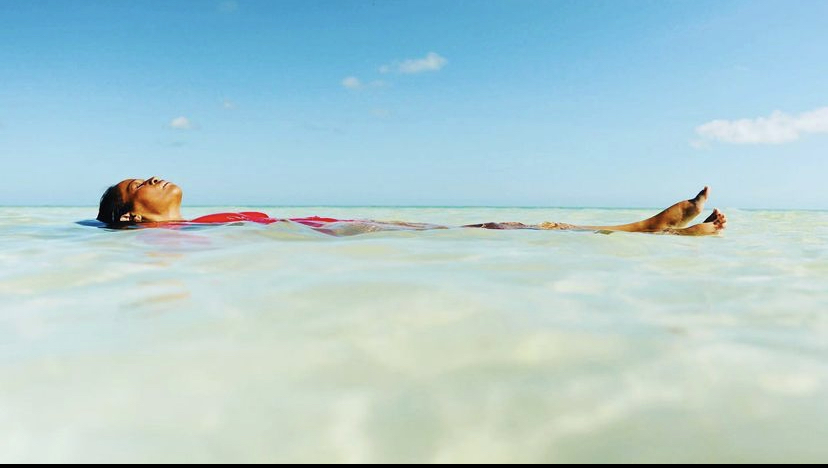“You’re doing great,” Natalie, the swim instructor, said. “Try again.”
I took a deep breath and submerged my face in the frigid, pool water. The images of my enslaved African ancestors flushed my memory as I blew a slow blast of bubbles.
I gasped for air as I broke the water’s surface and rubbed my eyes. My name is Kerra Bolton, and I am a middle-aged Black woman learning to swim. Did I look as ridiculous and frightened as I felt?
Facing My Fears
Fear of swimming is among my biggest fears.
Unlike some people who are afraid to swim, I never had a tragic experience with water. No dad, uncle, or brother laughingly threw me in the deep end of the pool, expecting me to naturally know how to swim to save myself. I waded in swimming pools and open waters to chest height and could touch the bottom or pool side with relative ease.
I spent many summers playing volleyball in the pool with family or perched lazily on a plastic ring as my teenage friends and I pondered our future. My family vacationed at the Jersey Shore once a week during the summer.
“Why don’t you ever dunk your face in the water?” one of my white friends would inevitably ask.
“Oh, you know…” I answered, allowing an explanation in the air.
But they didn’t know. I was too ashamed to explain why something that came naturally to them was monstrous for me. It’s hard for me to talk about my (and other Black people’s) dread of swimming because it triggers generational, epigenetic fear of water.
Blood in The Water
Our fear of the water may have been inherited.
Many black people in the United States are descendants of residents of coastal west African communities in countries like Senegal, Gambia, Côte d’Ivoire, Guinea, Sierra Leone, Liberia, Ghana, Benin, Cameroon, Benin and Nigeria.
Among these communities, Nigerians living in the country’s delta experienced the most intense connection with the water. They were known as expert swimmers and sailors. They were also among the first west Africans to trade with Europeans and unfortunately the most likely to help Europeans kidnap slaves from the interior.
Historical evidence suggests that as far back as the 15th century, 80 percent of Africans, including women, swam, compared to 20 percent of Europeans. West Africans even developed a prototype of the breaststroke that wasn’t used by the Europeans until 1899.
So, when and how did some Black people develop a fear of swimming and water?
Racism is Drowning Us
This is where epigenetics and racism come in.
Epigenetics describe inherited changes in genetic activity and expression without altering the DNA sequence itself.
Fear is a neurological and emotional response to environmental threats. While there is no such thing as a “fear gene,” researchers in 2014 found that profound stress in older generations of Holocaust survivors translated into genetic adaptations passed on to their children. You can inherit fear of the water, for example, from your grandmother as much as you can get her crooked smile or brown eyes.
Enslaved black Americans were forbidden to swim after whites realized slaves could swim to freedom. Slave masters often threatened to drown blacks as a means of discipline and cruelty.
Segregation and Jim Crow laws didn’t improve matters much. Blacks were denied access to the estimated 2,000 municipal swimming pools that first sprang up in neighborhoods during the 1920s and 30s. Even when de facto segregation ended, some white people built pools in their backyards or retreated to country clubs that could and did discriminate, rather than swim in the same pool as blacks.
The consequences of segregated pools are dire. Black children are three times more likely than white children to drown. An estimated 64 percent of black children have little or no ability to swim. Tragically, six black teens in Louisiana died in 2010 trying to save each other. Racism is literally drowning us.
Whipping My Wet Hair
Swimming has become more accessible to Black Americans in recent years.
Community organizations such as YWCA and YMCA have created a “Safety Around Water” program to help children become safe and strong swimmers. The Swim Global Project is an “internationally renowned organization dedicated to drowning prevention on a global scale.”
I want to help change the misperceptions about Black female swimmers. It’s not always about “not wanting to get our hair wet.” Epigenetics shows that our fears are inherited, and the trauma is real.
Swimming is the ultimate metaphor for navigating the world as a black woman. It requires awareness of your body, adjusting to your surroundings, and trusting the water to support you. For me, learning how to swim isn’t just a matter of survival, it’s a means to unlock my ancestral memory in a slave ship at the bottom of the ocean.
